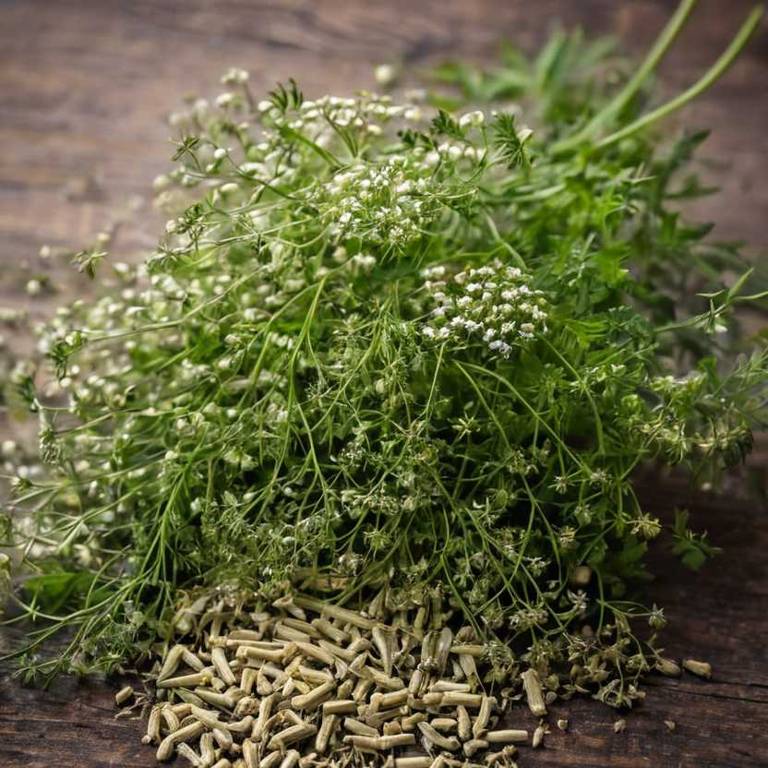Anthriscus sylvestris

Anthriscus sylvestris, commonly known as wild chervil or cow parsley, is a biennial flowering plant native to Europe and Western Asia.
This plant has been used for centuries in traditional medicine due to its numerous health benefits, including anti-inflammatory and antioxidant properties, which may help to reduce fever, alleviate digestive issues, and support immune function.
The therapeutic actions of wild chervil include its ability to stimulate digestion, relieve flatulence, and soothe menstrual cramps.
The bioactive constituents of Anthriscus sylvestris include coumarins, flavonoids, and volatile oils, which are responsible for its medicinal properties.
This page analize the most important medicinal aspects of Anthriscus sylvestris.
Table of Contents
Health Benefits of Anthriscus sylvestris
Anthriscus sylvestris has many benefits, such as being a natural remedy for digestive issues, with its seeds and roots used to treat bloating, gas, and indigestion.
It also possesses antispasmodic and anti-inflammatory properties, which can help alleviate menstrual cramps and soothe skin irritations.
Additionally, the plant's leaves and stems are rich in vitamins A and K, and its essential oils have been known to reduce stress and improve sleep quality.
By incorporating Anthriscus sylvestris into one's diet and lifestyle, individuals can experience improved overall health, increased energy, and enhanced mental clarity, ultimately leading to a more balanced and fulfilling life.
Therapeutic Actions of Anthriscus sylvestris
Anthriscus sylvestris has many therapeutic actions, such as its diuretic properties that help alleviate symptoms of urinary tract infections, while its anti-inflammatory properties soothe digestive issues like irritable bowel syndrome.
The antioxidant properties of Anthriscus sylvestris protect against oxidative stress, reducing the risk of chronic diseases like cancer and neurodegenerative disorders, allowing people to live healthier and more active lives.
Its antispasmodic properties also help relieve menstrual cramps and other muscle spasms, improving the quality of life for women with dysmenorrhea.
By promoting relaxation and reducing anxiety, Anthriscus sylvestris' sedative properties enable individuals to better manage stress and insomnia, leading to improved sleep and overall well-being.
Bioactive Constituents of Anthriscus sylvestris
Anthriscus sylvestris has many active constituents, such as volatile oils, flavonoids, alkaloids, phenolic acids, and coumarins, which contribute to its medicinal properties.
These constituents include apiol, falcarinol, and falcarinone, which have been found to have anti-inflammatory, antioxidant, and anti-cancer properties, helping to improve cardiovascular health and reduce the risk of chronic diseases.
The flavonoids present in the plant, such as kaempferol and quercetin, have been shown to have anti-inflammatory and antimicrobial effects, which can help to alleviate symptoms of conditions like arthritis and skin infections.
By harnessing the medicinal properties of Anthriscus sylvestris, individuals can benefit from improved overall health, reduced risk of chronic diseases, and enhanced quality of life.
Medicinal Parts of Anthriscus sylvestris
Anthriscus sylvestris has many medicinal parts, such as its leaves and roots, which are used in traditional medicine.
The leaves of Anthriscus sylvestris contain volatile oils, flavonoids, and coumarins, including furanocoumarins, which have antioxidant and anti-inflammatory properties.
The roots of the plant are rich in coumarins, particularly bergapten and psoralen, which have been used to treat skin conditions like psoriasis and eczema.
Additionally, the seeds and fruits of Anthriscus sylvestris contain essential oils and flavonoids, which may have antibacterial and anti-inflammatory effects.
Herbal Preparations of Anthriscus sylvestris
Anthriscus sylvestris has many herbal preparations, such as teas, tinctures, and infusions, that have been used for various medicinal purposes.
The tea made from the leaves of Anthriscus sylvestris has been used to help reduce fever and alleviate symptoms associated with colds and flu.
Tinctures prepared from the plant's roots and leaves have been traditionally used to treat digestive issues, such as bloating and indigestion, while also being used as a mild sedative.
Infusions, on the other hand, have been used to help soothe menstrual cramps and ease symptoms of PMS in women.
Possible Side Effects of Anthriscus sylvestris
Anthriscus sylvestris can have side effects if used improperly, such as inducing a condition known as Berries' disease or Berries' condition, which can cause neurological symptoms like numbness, tingling, and muscle weakness.
Prolonged consumption of the plant's seeds may also lead to thyroid problems and goiter due to the presence of a compound called furanocoumarin.
Additionally, improper use of anthriscus sylvestris can cause gastrointestinal issues like nausea, vomiting, and diarrhea in some individuals.
It is essential to consult with a healthcare professional before using the plant for medicinal purposes.